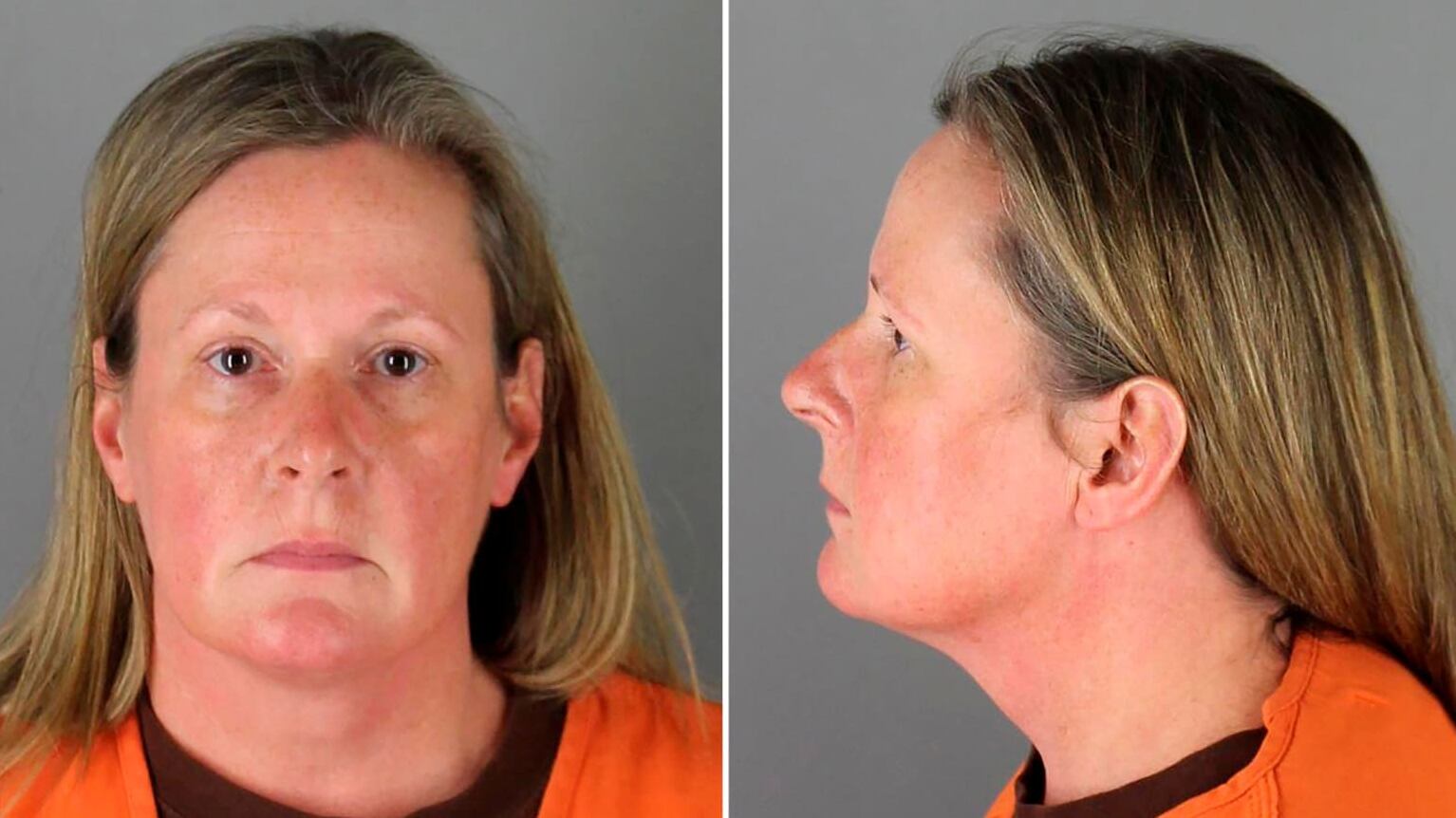Kim Potter, the white former suburban Minneapolis police officer who fatally shot Daunte Wright in April after allegedly mistaking her handgun for a Taser during a traffic stop, testified in her own defense on Friday.
Potter, a 49-year-old who resigned from the Brooklyn Center, Minnesota, force over the shooting of the 20-year-old Black man after 26 years on the job, is facing first-degree manslaughter and second-degree manslaughter charges. She has pleaded not guilty.
“I’m sorry it happened! I’m so sorry, I'm so sorry.” Potter told jurors as she began to sob on the stand during cross-examination. “I didn’t want to hurt anybody.”
The emotional apology came after Potter claimed that she would have “most likely not” stopped Wright for allegedly expired tabs and an air freshener on April 11, but that the field officer she was with did so as part of his training.
“Officer [Anthony] Luckey wanted to stop the vehicle,” Potter said on Friday, claiming that if she were alone that day, she would have not have done so. One reason for that, she claimed, was that the ongoing pandemic had made it difficult for some drivers to update their car tags, and officers were sympathetic to that.
Potter then proceeded to describe what she described as a frenetic situation that ended with her shooting Wright with her handgun instead of her Taser.
“We were trying to keep him from driving away. It just went chaotic,” Potter said through tears. “I remember yelling ‘Taser! Taser! Taser!’ and nothing happened, and then [Luckey] told me I shot him.”
The former cop added that the next thing she remembered was an ambulance arriving for her and eventually going back to the police station.
Potter added through tears that she “quit” her job a few days after the shooting and eventually moved out of the state. The former cop said that she was immediately nervous for her law-enforcement colleagues after the shooting, which occurred amid the trial of Derek Chauvin, the former Minneapolis cop who murdered George Floyd last year and prompted mass protests.
“There was so much [sic] bad things happening that I didn’t want my co-workers, I didn’t want anything bad to happen to the city,” Potter said.
After Potter’s emotional testimony, her defense team rested their case on Friday. Judge Regina Chu said the 12-person jury will hear closing arguments on Monday then start deliberating.
Throughout the six-day trial, prosecutors have presented over two-dozen witnesses in an attempt to show Potter was criminally negligent during the April 11 incident. To prove the first-degree manslaughter charges under Minnesota law, prosecutors need to convince jurors that Potter caused Wright’s death with “reckless handling or use of a firearm so as to endanger the safety of another with such force and violence that death or great bodily harm to any person was reasonably foreseeable.”
To prove the second-degree charge, prosecutors need to show that Potter “caused an unreasonable risk” by using a firearm.
“The use of deadly force was not appropriate, and the evidence suggests that a reasonable officer in Officer Potter’s position could not have believed it was proportional to the threat at the time,” University of South Carolina School of Law associate professor Seth Stoughton told jurors on Wednesday, labeling the former cop’s actions “excessive and inappropriate.”
Potter’s defense team, however, insists that Wright was resisting arrest and use of force was warranted.
Among those who defended Potter this week was her former Brooklyn Center Police chief Tim Gannon, who resigned with her the day before she was arrested after publicly insisting the incident was justified. On the stand, Gannon doubled-down on the analysis, stating that he concluded there was “no violation… of police, procedure, law” after reviewing Potter’s body-camera footage.
Officer Luckey told jurors last week that he and Potter, his field training officer, pulled Wright over for expired car tabs and an air freshener on the afternoon of April 11. After performing a records check, Luckey said, he discovered the man had an outstanding gross misdemeanor warrant and asked him to step out of the car.
“The plan was for Officer Luckey to get the driver into custody for the warrant, and we would further investigate with the female,” Potter said, mentioning Wright’s girlfriend who was in the car at the time.
Body-camera footage shows Wright getting out of his car, then jumping back inside before Luckey could handcuff him. Potter told jurors that during the attempted arrest, Luckey started to tell Wright “Don’t do that, don’t tense up, stop doing that” before the situation devolved.
In the footage played in court, Potter is then seen grabbing her handgun with her right hand before pointing it at Wright and yelling about the Taser.
About a second later, Potter fired a single shot at Wright’s left side. The criminal complaint against her states that Wright cried out in pain before his car sped off for a few blocks and eventually crashed into another car.
“Oh my God!” Potter is heard telling Luckey in body-cam footage played to jurors. “Holy shit! I just shot him!” In another clip played in court, Potter can be seen sobbing on the ground, insisting she didn’t know what she did.
The Hennepin County Medical Examiner’s office has said Wright died from the gunshot and that his death was a homicide. After the incident, a Minnesota Department of Public Safety Bureau of Criminal Apprehension investigator examined Potter’s duty belt and concluded that her handgun was holstered on the right side and her Taser on the left.
Prosecutors argued to jurors that Potter knew that the gun was on her right-dominant side and her Taser on her left—and recklessly grabbed the wrong one during Wright’s arrest.
“We trust [police officers] to know wrong from right, and left from right,” Minnesota Assistant Attorney General Erin Eldridge said last Wednesday.





